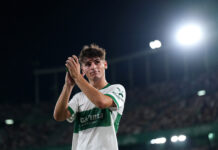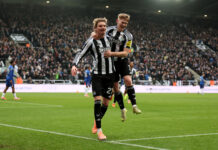Andre Schurrle has officially announced his retirement from professional football, at the age of just 29. The announcement came a few days after Borussia Dortmund revealed that they have terminated the winger’s contract as the Bundesliga giants look to cope with the financial damage inflicted by the Coronavirus. But, what exactly went wrong for Andre Schurrle at BVB?
Schurrle’s story at Borussia Dortmund has been full of lows and very few highlights. He divided the fan base even when he moved to the club back in 2016.
The €30 million fee was often labelled “too much” by fans. Although the attacker’s experience of working under then-coach Thomas Tuchel, during their time together at Mainz, combined with his successes at VfL Wolfsburg, was enough to create a layer of optimism around the transfer. There were, however, naysayers who doubted whether Schurrle’s playing style would tune in well with Borussia Dortmund’s philosophy.
Schurrle endured a miserable debut season at Borussia Dortmund. A twisted knee and an Achilles problem, in particular, marred his first season at the Signal Iduna Park, keeping him out for a chunk of the campaign. He made only 15 league appearances, scoring just two goals.
The German international endured a similar fate the following campaign, this time under Peter Bosz. He missed the first phase of the 2017/18 season due to a torn muscle fibre. He ended the campaign by scoring only one goal in 18 appearances after returning to full fitness. It didn’t make a good impression on new coach Lucien Favre, who shipped him out on loan to Fulham in 2018.

How Borussia Dortmund Moved On
When Dortmund signed Schurrle in 2016, they simultaneously secured the services of other talented attackers including Mario Gotze, Ousmane Dembele and Emre Mor. In addition, they already had Christian Pulisic and Marco Reus.
While it wasn’t until the 2017/18 campaign when Pulisic really made an impact in the first-team, Dembele’s rapid rise to prominence, combined with the eventual emergence of the American whizkid made it difficult for Schurrle to gain any sort of relevance in the team.
The excellent combination of pace and trickery that was prevalent among youngsters like Dembele, Pulisic and Jadon Sancho suited Dortmund’s style more than Schurrle’s direct play, with the German lacking that considerable pace and ability to dribble through individuals.
As a result, the ex-Bayer Leverkusen sensation found it difficult to adapt as Borussia Dortmund moved on from a heavy metal brand of football under Jurgen Klopp to a more possession-oriented style of play, inspired by Tuchel, and later, Peter Bosz and Favre.

And since then, BVB have signed a host of talented attackers across Europe, especially under Favre. The Swiss mastermind most notably brought in Thorgan Hazard and Julian Brandt last summer and under his leadership, players like Sancho and Giovanni Reyna, players blessed with skill and pace, gained massive significance.
Mental health and a state of freedom
While injuries did play a key role in stifling Schurrle’s progress, there is no doubt that it was his lack of performances that convinced him to make the decision.
Having won the FIFA World Cup in 2014 – the biggest glory in professional football to failing to perform even in the Russian Premier League is undoubtedly a harsh decline to fathom for any footballer. The obvious trauma and the mental health issue it can create was echoed by Schurrle himself during his interview with Spiegel.
“The depths were getting deeper and deeper and the highlights less and less. You always have to play a certain role to survive in the business, otherwise, you will lose your job and not get another one either”, said the former German international, citing the lack of attention given to mental health in professional football.
In an era where cash-rich leagues like Major League Soccer, the Chinese Super League and the Japanese League have created a financial provenance for ageing footballers, Schurrle’s decision to hang up his boots, even at the age of 29, is a breath of fresh air.
The retirement should provide the German with newfound freedom and an ideal path to enjoy his personal life, with his wife and kid. But it should also be taken as a cry on behalf of their players as they deal with mental health problems, in a football industry dominated by demanding fans and competition.

 ADD AS PREFERRED SOURCE ON GOOGLE
ADD AS PREFERRED SOURCE ON GOOGLE



Comments are closed.